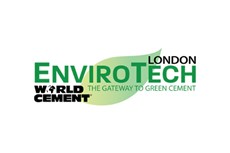First fully decarbonised cement plant in Germany: Heidelberg Materials gets support from the EU Innovation Fund
Published by Sol Klappholz,
Assistant Editor
World Cement,
The EU Innovation Fund, one of the world’s largest funding programmes for innovative low-carbon technologies, has selected Heidelberg Materials’ pioneering GeZero carbon capture and storage (CCS) project for grant agreement preparation.
GeZero’s unique approach will model a solution for inland sites that are not in close proximity to the coast or a waterway. The project includes a transport solution to bridge the gap until the necessary pipeline infrastructure will be available and is scaled to capture around 700,000 tonnes of CO2 annually. As the facility also captures emissions from biomass substituting fossil fuels, Geseke will be one of the first European cement plants able to produce fully decarbonised cement and clinker. Construction of the facility will start in 2026, and commissioning is planned for 2029.
“We are eager to get started. GeZero is a true early-mover project for fast and deep decarbonisation in one of the biggest industrial countries globally. With its completely new logistical concept, it adds an important model solution for inland industrial sites to our existing CCUS portfolio,” said Dr Nicola Kimm, Chief Sustainability Officer and member of the Managing Board.
In addition to the capture facility, the GeZero project will bring a new 2nd generation oxyfuel kiln combined with CO2 purification, a liquefaction unit, as well as rail loading and interim storage facilities. The electrical energy demand is to be covered exclusively by renewable energies. A new photovoltaic plant on the factory premises will help cover the demand.
Project partner Wintershall Dea will be responsible for the permanent storage of the CO2. Once captured, it will be transported to Wintershall Dea’s distribution hub in Wilhelmshaven. From there, it will be transported via ship/pipeline to offshore storage sites in the North Sea. To create further synergies, GeZero will also act as a reception hub for local, smaller CO2 emitters, giving them access to the intermediate storage and rail loading infrastructure.
“This project sets an important milestone for the cement industry and for effective carbon management in Germany. We are now counting on the tailwind of Germany’s future Carbon Management Strategy and the regulatory framework to come,” said Christian Knell, General Manager Germany of Heidelberg Materials.
The EU Innovation Fund focuses on flagship projects with European value added that can bring significant emission reductions. In response to its third call for large-scale projects, the European Commission had received 239 applications. 41 projects were selected for preparation of a Grant Agreement, including five from the cement and lime sector. The final grant agreement is expected for end of 2023.
Click here for free registration to World Cement
Read the article online at: https://www.worldcement.com/europe-cis/14072023/first-fully-decarbonised-cement-plant-in-germany-heidelberg-materials-gets-support-from-the-eu-innovation-fund/
You might also like
The World Cement Podcast
A podcast series for professionals in the cement industry featuring short, insightful interviews. Subscribe on your favourite podcast app to start listening today.

